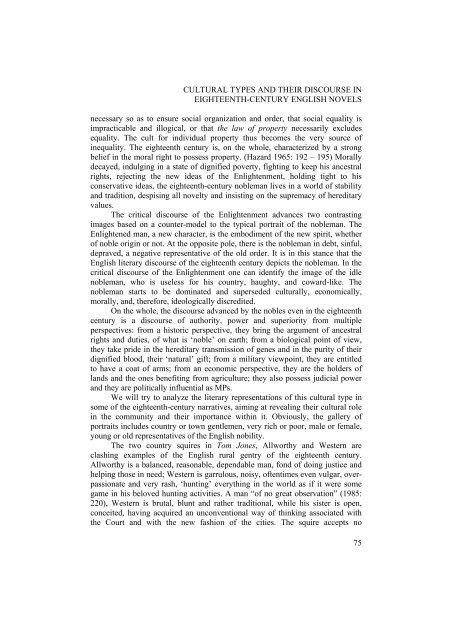culture, subculture and counterculture - Facultatea de Litere
culture, subculture and counterculture - Facultatea de Litere
culture, subculture and counterculture - Facultatea de Litere
Create successful ePaper yourself
Turn your PDF publications into a flip-book with our unique Google optimized e-Paper software.
CULTURAL TYPES AND THEIR DISCOURSE IN<br />
EIGHTEENTH-CENTURY ENGLISH NOVELS<br />
necessary so as to ensure social organization <strong>and</strong> or<strong>de</strong>r, that social equality is<br />
impracticable <strong>and</strong> illogical, or that the law of property necessarily exclu<strong>de</strong>s<br />
equality. The cult for individual property thus becomes the very source of<br />
inequality. The eighteenth century is, on the whole, characterized by a strong<br />
belief in the moral right to possess property. (Hazard 1965: 192 – 195) Morally<br />
<strong>de</strong>cayed, indulging in a state of dignified poverty, fighting to keep his ancestral<br />
rights, rejecting the new i<strong>de</strong>as of the Enlightenment, holding tight to his<br />
conservative i<strong>de</strong>as, the eighteenth-century nobleman lives in a world of stability<br />
<strong>and</strong> tradition, <strong>de</strong>spising all novelty <strong>and</strong> insisting on the supremacy of hereditary<br />
values.<br />
The critical discourse of the Enlightenment advances two contrasting<br />
images based on a counter-mo<strong>de</strong>l to the typical portrait of the nobleman. The<br />
Enlightened man, a new character, is the embodiment of the new spirit, whether<br />
of noble origin or not. At the opposite pole, there is the nobleman in <strong>de</strong>bt, sinful,<br />
<strong>de</strong>praved, a negative representative of the old or<strong>de</strong>r. It is in this stance that the<br />
English literary discourse of the eighteenth century <strong>de</strong>picts the nobleman. In the<br />
critical discourse of the Enlightenment one can i<strong>de</strong>ntify the image of the idle<br />
nobleman, who is useless for his country, haughty, <strong>and</strong> coward-like. The<br />
nobleman starts to be dominated <strong>and</strong> superse<strong>de</strong>d culturally, economically,<br />
morally, <strong>and</strong>, therefore, i<strong>de</strong>ologically discredited.<br />
On the whole, the discourse advanced by the nobles even in the eighteenth<br />
century is a discourse of authority, power <strong>and</strong> superiority from multiple<br />
perspectives: from a historic perspective, they bring the argument of ancestral<br />
rights <strong>and</strong> duties, of what is ‘noble’ on earth; from a biological point of view,<br />
they take pri<strong>de</strong> in the hereditary transmission of genes <strong>and</strong> in the purity of their<br />
dignified blood, their ‘natural’ gift; from a military viewpoint, they are entitled<br />
to have a coat of arms; from an economic perspective, they are the hol<strong>de</strong>rs of<br />
l<strong>and</strong>s <strong>and</strong> the ones benefiting from agri<strong>culture</strong>; they also possess judicial power<br />
<strong>and</strong> they are politically influential as MPs.<br />
We will try to analyze the literary representations of this cultural type in<br />
some of the eighteenth-century narratives, aiming at revealing their cultural role<br />
in the community <strong>and</strong> their importance within it. Obviously, the gallery of<br />
portraits inclu<strong>de</strong>s country or town gentlemen, very rich or poor, male or female,<br />
young or old representatives of the English nobility.<br />
The two country squires in Tom Jones, Allworthy <strong>and</strong> Western are<br />
clashing examples of the English rural gentry of the eighteenth century.<br />
Allworthy is a balanced, reasonable, <strong>de</strong>pendable man, fond of doing justice <strong>and</strong><br />
helping those in need; Western is garrulous, noisy, oftentimes even vulgar, overpassionate<br />
<strong>and</strong> very rash, ‘hunting’ everything in the world as if it were some<br />
game in his beloved hunting activities. A man “of no great observation” (1985:<br />
220), Western is brutal, blunt <strong>and</strong> rather traditional, while his sister is open,<br />
conceited, having acquired an unconventional way of thinking associated with<br />
the Court <strong>and</strong> with the new fashion of the cities. The squire accepts no<br />
75












